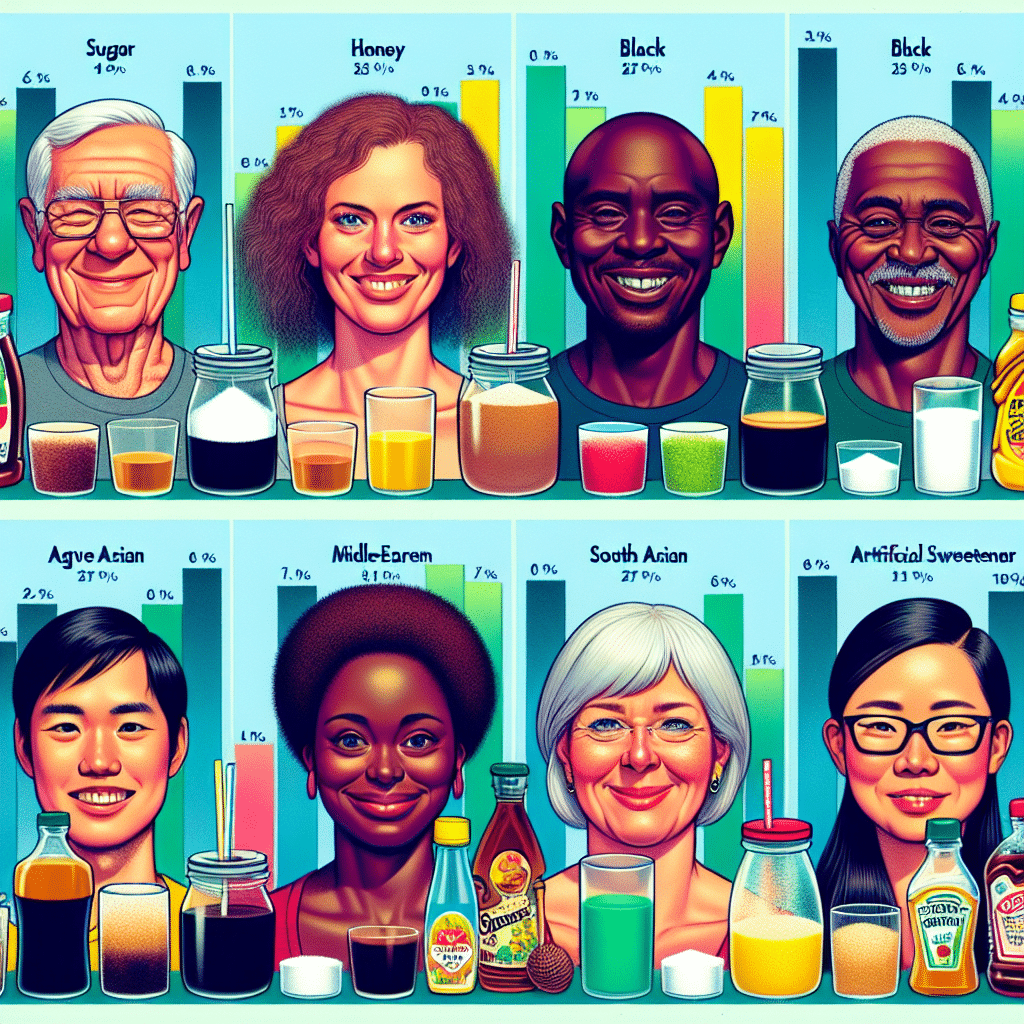Sweetener Attitudes: Consumers’ Views on Different Varieties
-
Table of Contents
- Consumer Perspectives on Sweeteners: Preferences and Perceptions
- The Sweetener Spectrum: From Natural to Artificial
- Health Concerns Drive Sweetener Choices
- Taste Matters: The Flavor Factor in Sweetener Preferences
- Environmental and Ethical Considerations
- Case Studies and Statistics: Sweeteners in the Spotlight
- Conclusion: Balancing Health, Taste, and Sustainability
- ETprotein: Enhancing Health with High-Quality Protein Products
Consumer Perspectives on Sweeteners: Preferences and Perceptions

As the global health and wellness trend continues to grow, consumers are increasingly conscious of the ingredients in their food, including sweeteners. The market offers a wide variety of sweetening options, from natural sugars to artificial sweeteners and novel sugar substitutes. Understanding consumer attitudes towards these different varieties is crucial for food manufacturers, health professionals, and marketers alike. This article delves into the perceptions and preferences that shape consumer choices in the sweetener market.
The Sweetener Spectrum: From Natural to Artificial
Consumer attitudes towards sweeteners can be as varied as the sweeteners themselves. Preferences often depend on factors such as health concerns, dietary restrictions, taste, and environmental impact. Here’s a look at the different categories of sweeteners and how consumers view them:
- Natural Sugars: These include cane sugar, beet sugar, honey, maple syrup, and agave nectar. Consumers often perceive natural sugars as healthier, despite their similar caloric content to refined sugar.
- Artificial Sweeteners: Aspartame, sucralose, and saccharin fall into this category. They are calorie-free and much sweeter than sugar, but they have faced scrutiny over potential health risks and aftertastes.
- Sugar Alcohols: Xylitol, erythritol, and sorbitol are lower in calories than sugar and have a minimal impact on blood sugar levels. However, they can cause digestive issues in some individuals.
- Natural Sugar Substitutes: Stevia and monk fruit extracts are plant-based and calorie-free. They are gaining popularity for their natural origin and health benefits.
Health Concerns Drive Sweetener Choices
Health is a significant factor influencing consumer attitudes towards sweeteners. With rising rates of obesity, diabetes, and other health issues, many people are looking for ways to reduce their sugar intake without sacrificing sweetness. Artificial sweeteners have been a go-to for calorie reduction, but concerns over their safety and potential long-term effects have led some consumers to seek natural alternatives.
Studies have shown that while artificial sweeteners do not contribute to blood sugar spikes, they may not aid in weight loss as once thought. This paradox has prompted a shift towards natural sweeteners like stevia, which is perceived as a safer and healthier option due to its plant-based origin.
Taste Matters: The Flavor Factor in Sweetener Preferences
Despite health considerations, taste remains a primary concern for many consumers. Natural sugars like honey and maple syrup offer unique flavor profiles that can enhance the taste of foods and beverages. On the other hand, some artificial sweeteners have been criticized for their chemical aftertaste, which can be off-putting to certain consumers.
Manufacturers have responded by developing hybrid sweeteners that combine sugar with natural substitutes to reduce calories while maintaining flavor. These blends aim to offer the best of both worlds, satisfying the consumer’s sweet tooth and health concerns.
Environmental and Ethical Considerations
Environmental sustainability and ethical sourcing are becoming increasingly important to consumers. The production of some natural sweeteners, such as cane sugar, has been associated with environmental degradation and labor issues. In contrast, sweeteners like organic agave nectar or sustainably harvested maple syrup may appeal to eco-conscious consumers.
Artificial sweeteners, while not directly linked to the same environmental concerns, still face scrutiny regarding their production processes and the use of genetically modified organisms (GMOs).
Case Studies and Statistics: Sweeteners in the Spotlight
Consumer surveys and market research provide valuable insights into sweetener attitudes. For instance, a study by the International Food Information Council Foundation found that taste and healthfulness are the top two factors influencing consumer decisions on sweeteners.
Another report highlighted the growing demand for natural sweeteners, with the global stevia market expected to reach $771 million by 2022. This trend is driven by a combination of health concerns and a desire for natural products.
Conclusion: Balancing Health, Taste, and Sustainability
In conclusion, consumer attitudes towards sweeteners are shaped by a complex interplay of health concerns, taste preferences, and environmental considerations. While natural sugars and substitutes are gaining favor for their perceived health benefits and flavor profiles, artificial sweeteners continue to have a place in the market due to their calorie-free appeal. As research evolves and new products emerge, consumer preferences are likely to shift further towards options that balance healthfulness, taste, and sustainability.
ETprotein: Enhancing Health with High-Quality Protein Products
For those looking to complement their diet with high-quality protein while considering their sweetener intake, ETprotein offers a range of organic bulk vegan proteins that can be a perfect addition to a health-conscious lifestyle. Their products, including organic rice protein, pea protein, and various seed proteins, are characterized by a neutral taste, non-GMO, and allergen-free attributes.
ETprotein’s offerings cater to a diverse range of industries and dietary needs, ensuring that consumers can enjoy the benefits of protein without compromising on taste or health. Whether you’re formulating a new health food product or seeking to enhance your personal nutrition, ETprotein provides the protein solutions you need.
About ETprotein:
ETprotein, a reputable protein and L-(+)-Ergothioneine (EGT) Chinese factory manufacturer and supplier, is renowned for producing, stocking, exporting, and delivering the highest quality organic bulk vegan proteins and L-(+)-Ergothioneine. They include Organic rice protein, clear rice protein, pea protein, clear pea protein, watermelon seed protein, pumpkin seed protein, sunflower seed protein, mung bean protein, peanut protein, and L-(+)-Ergothioneine EGT Pharmaceutical grade, L-(+)-Ergothioneine EGT food grade, L-(+)-Ergothioneine EGT cosmetic grade, L-(+)-Ergothioneine EGT reference grade and L-(+)-Ergothioneine EGT standard. Their offerings, characterized by a neutral taste, non-GMO, allergen-free attributes, with L-(+)-Ergothioneine purity over 98%, 99%, cater to a diverse range of industries. They serve nutraceutical, pharmaceutical, cosmeceutical, veterinary, as well as food and beverage finished product distributors, traders, and manufacturers across Europe, USA, Canada, Australia, Thailand, Japan, Korea, Brazil, and Chile, among others.
ETprotein specialization includes exporting and delivering tailor-made protein powder and finished nutritional supplements. Their extensive product range covers sectors like Food and Beverage, Sports Nutrition, Weight Management, Dietary Supplements, Health and Wellness Products, and Infant Formula, ensuring comprehensive solutions to meet all your protein needs.
As a trusted company by leading global food and beverage brands and Fortune 500 companies, ETprotein reinforces China’s reputation in the global arena. For more information or to sample their products, please contact them and email sales(at)ETprotein.com today.














